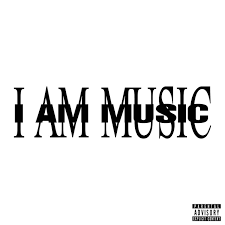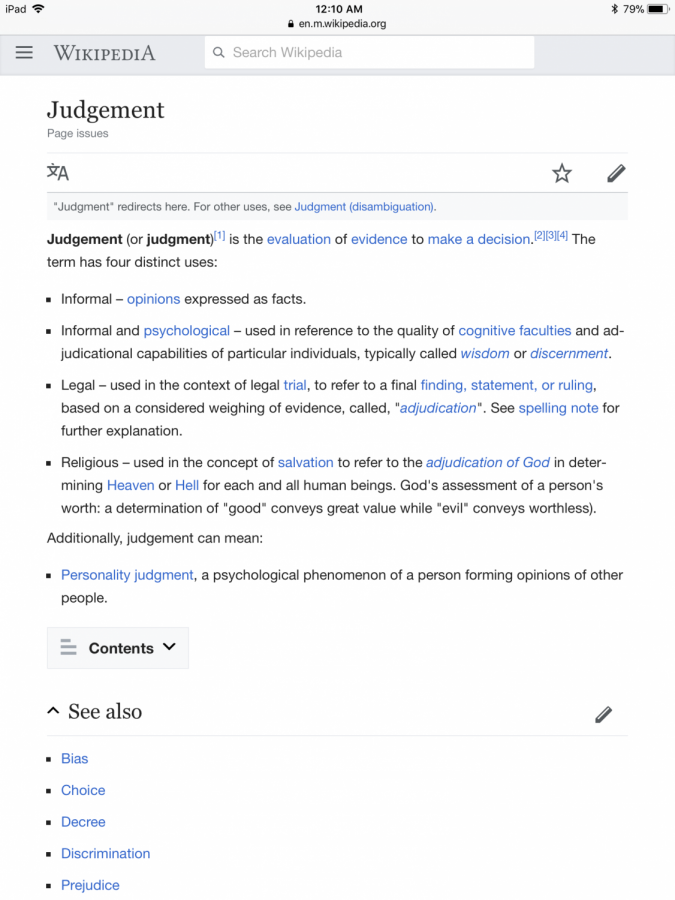What Is Judgement?
And why so much negativity surrounds such a simple word
May 11, 2018
You are judging me right now. And you were judging me before you even started looking at this article. Maybe you looked at the picture on this article and thought it looked interesting. Maybe you were browsing a specific category because you find it the most entertaining, or informative, or thought provoking. Maybe you are only reading this article at the recommendation of a friend. Judgment is defined as the evaluation of evidence to make a decision. Judgment helps us form opinions. And the truth of the matter is, we, as humans, constantly judge each other, our surroundings, and our experiences, and we will not stop.
So much of our modern culture is is devoted to judgment free spaces, and and an all accepting attitude, in hopes of eliminating “judgment.” But the flaw in this idea is that judgment is portrayed through a primarily negative lense. Judgment includes constructive criticism, opinions, choices, and even religious concepts. Without judgment, we would hardly we able to function. Our systems, which depend on evaluations and determinations, would fall, and chaos would ensue. Humanity itself would stop growing, and would backtrack as far as history would allow; to a time before any people inhabited the earth.
In order to reform the cultural idea of judgment, most likely one that has a negative connotation attached to it, we need to acknowledge what judgment really is, and how prevalent positive and negative judgment is in our lives. Judgment occurs whenever we make decisions between things, such as what to wear in the morning, and what homework needs to be done for the day. Judgment through evaluation occurs when we decide if it is going to be too cold to wear shorts, or if we need to leave for school a little bit earlier due to the weather. We see constructive criticism every day when a paper is graded, or a friend gives us suggestions about a problem or a class. These forms of judgment occur an uncountable amount of times per day, every day, every year, for all the years for the rest of our lives. These are all forms of judgment that have positive, or relatively neutral effects on us and our routines, and constitute the majority of judgments made by individuals.
So if negative judgments made by individuals are in the minority, why is the connotation attached to the word judgment negative? When we hear the word judgment, why are we so eager to think of hate speech, gender wage gaps, and discrimination of many different kinds? The answer to this question is that our culture has created a negative connotation of judgment, and we have adapted and subscribed to the idea of the negativity that our culture has forced upon the shoulders of a single word.
This adaptation and subscription to the assumed negativity of judgment is prevalent all around us, and shows itself in many different forms. To satisfy a curiosity about how prevalent the negative connotation of judgment is in our society, I turned to the one tangible device that unites people all around the United States, and connects us to people all around the globe – the internet. And you know how suggestions start to pop up as you type words into the search bar, I searched “judged for being a,” and then looked at the suggestions. The results were judged for being a virgin, judged for being a young mom, and judged for being a single mom. Since when are those things bad things? Who decided that being a virgin, or clearly not, was something that is held at an inferior level?

Clearly not the people that are being judged for the aforementioned things. So I thought maybe if I gave Google a clue that not all judgment is bad, it would give me some more likable suggestions. So I searched “judgment is positive.” Zero results. Zero suggestions. Zero positivity. Which proves the argument that people are associating the word judgment with negative things, and not positive things. But I thought the more important response to this experiment was, why are there no matches for positivity?

In order to untangle the issue of the culture-induced negativity that has fallen upon the heavy shoulders of judgment, the first problem that must be addressed is why there is such an inclination to pin negativity on things.
Our culture is so focused on eliminating hate and judgment and discrimination, that anything not inside the lines of the judgment free zone becomes the attacker – in this case, judgment. This cultural habit is not specific to judgment; our culture does this with anything it can get its hands on. Reverse racism, gender related phobias, war. A great example of our culture villainizing an independent process is war. War is an independent process that is both negative and positive, but isolated in itself, it does not affect us, therefore rendering it neutral. When a country is at war, that particular country is rising up against an enemy, whatever that enemy may comprise, and the primary objective of a war is to overcome the enemy. And so often, during times of war, a country or a people become so consumed with hating the enemy, that they forget why they even bother to fight. See, before our focus is sold to the decided upon “attacker” of the “mission,” we fight because we love what is behind us, not because we hate what is in front of us. And so often, that original intention gets lost during the crusade, which results is a hate-filled expedition to team up against the common enemy, which is currently various forms discrimination. However, as intentions and focus frequently ventures off target, all of this negative energy is directed towards judgment, resulting in a negative connotation attaching itself to the neutral concept.
The key to eliminating the negative connotation attached to judgment is to first acknowledge the positivity of judgment. The answer is not to practice more forms of positive judgment, since positive judgment is overwhelmingly present in everyday life, but to acknowledge when we do practice it.
I think everyone can recite the definition of judgment and all the forms that it encompasses; furthermore, I think that everyone understands what judgment means, the positive, the negative, and the neutral essence. But I believe the cultural lense with which we often view the world and it’s experiences clouds our minds to the truth of the reality. Judgment has many truths, that live in many different people, each with individual subjective perspectives on what exactly judgment is, and what role it plays in their lives. When the objective is to love what we fight for more than hate what we desire to abolish, the objective is more rapidly accomplished, and it is an accomplishment created from love and joy, instead of negativity and hate.






































